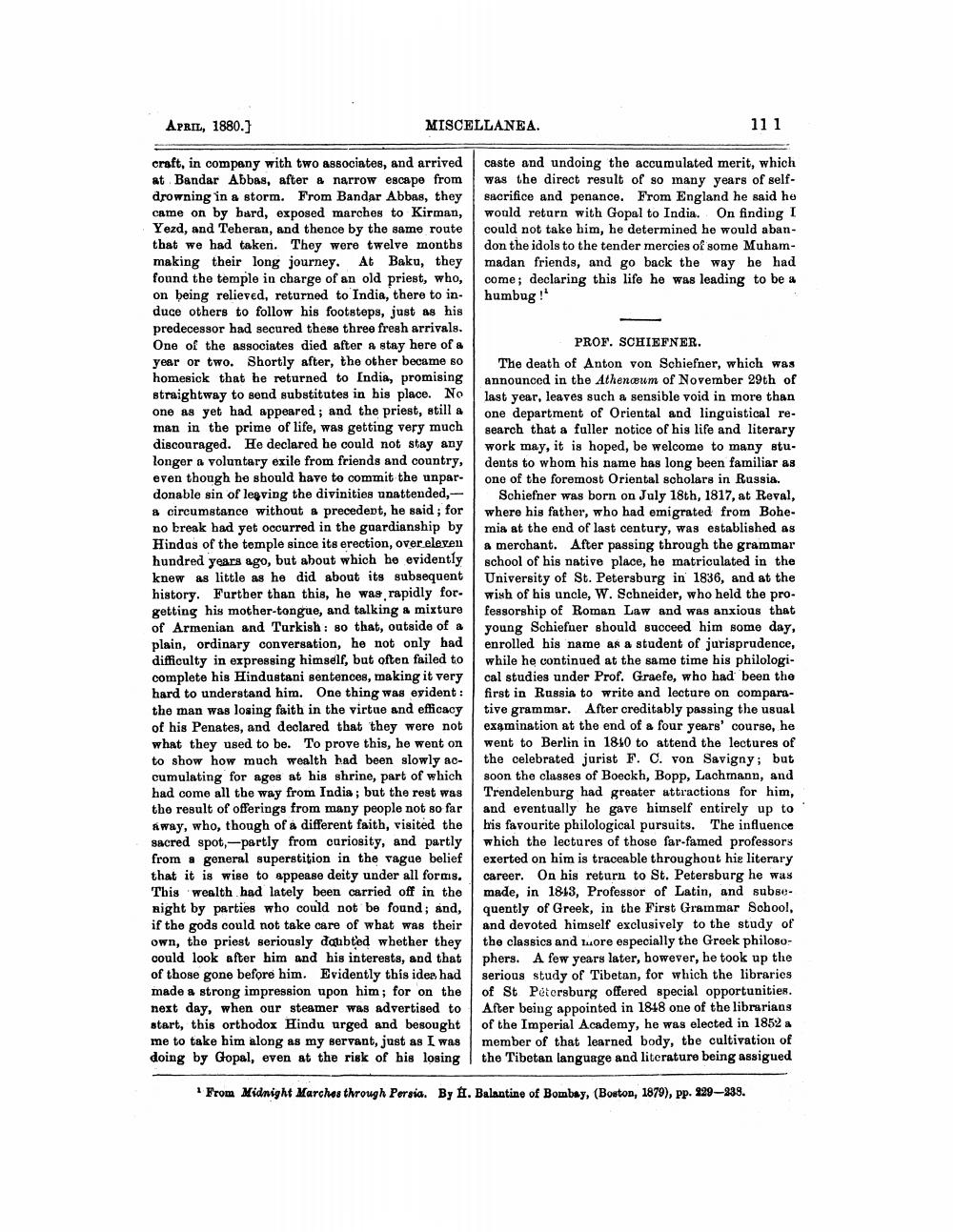________________
APRIL, 1880.]
MISCELLANEA.
111
caste and undoing the accumulated merit, which was the direct result of so many years of selfsacrifice and penance. From England he said he would return with Gopal to India. On finding I could not take him, he determined he would abandon the idols to the tender mercies of some Muhammadan friends, and go back the way he had come; declaring this life he was leading to be a humbug!"
craft, in company with two associates, and arrived at Bandar Abbas, after & narrow escape from drowning in a storm. From Bandar Abbas, they came on by bard, exposed marches to Kirman, Yezd, and Teheran, and thence by the same route that we had taken. They were twelve months making their long journey. At Baku, they found the temple in charge of an old priest, who, on being relieved, returned to India, there to in. duce others to follow his footsteps, just as his predecessor had secured these three fresh arrivals. One of the associates died after a stay here of a year or two. Shortly after, the other became so homesick that he returned to India, promising straightway to send substitutes in his place. No one as yet had appeared ; and the priest, still & man in the prime of life, was getting very much discouraged. He declared he could not stay any longer a voluntary exile from friends and country, even though he should have to commit the unpardonable sin of leaving the divinities unattended, & circumstance without & precedent, he said, for no break had yet occurred in the guardianship by Hindas of the temple since its erection, over eleven hundred years ago, but about which he evidently knew as little as he did about its subsequent history. Further than this, he was rapidly forgetting his mother tongue, and talking a mixture of Armenian and Turkish : 80 that, outside of a plain, ordinary conversation, he not only had difficulty in expressing himself, but often failed to complete his Hindustani sentences, making it very hard to understand him. One thing was evident: the man was losing faith in the virtue and efficacy of his Penates, and declared that they were not what they used to be. To prove this, he went on to show how much wealth had been slowly accumulating for ages at his shrine, part of which had come all the way from India; but the rest was the result of offerings from many people not so far away, who, though of a different faith, visited the sacred spot, -partly from curiosity, and partly from a general superstition in the vague belief that it is wise to appease deity under all forms. This wealth had lately been carried off in the night by parties who could not be found; and, if the gods could not take care of what was their own, the priest seriously doubted whether they could look after him and his interests, and that of those gone before him. Evidently this idea had made a strong impression upon him; for on the next day, when our steamer was advertised to start, this orthodox Hindu urged and besought me to take him along as my servant, just as I was doing by Gopal, even at the risk of his losing
PROF. SCHIEFNER. The death of Anton von Schiefner, which was announced in the Athenæum of November 29th of last year, leaves such a sensible void in more than one department of Oriental and linguistical research that a fuller notice of his life and literary work may, it is hoped, be welcome to many students to whom his name has long been familiar as one of the foremost Oriental scholars in Russia.
Schiefner was born on July 18th, 1817, at Reval, where his father, who had emigrated from Bohemia at the end of last century, was established as a merchant. After passing through the grammar school of his native place, he matriculated in the University of St. Petersburg in 1836, and at the wish of his uncle, W. Schneider, who held the professorship of Roman Law and was anxious that young Schiefuer should succeed him some day, enrolled his name as a student of jurisprudence, while he continued at the same time his philological studies under Prof. Graefe, who had been the first in Russia to write and lecture on comparutive grammar. After creditably passing the usual examination at the end of a four years' course, he went to Berlin in 1810 to attend the lectures of the celebrated jurist F. C. von Savigny; but soon the classes of Boeckh, Bopp, Lachmann, and Trendelenburg had greater attractions for him, and eventually he gave himself entirely up to bris favourite philological pursuits. The influence which the lectures of those far-famed professors exerted on him is traceable throughout hie literary career. On his return to St. Petersburg he was made, in 1813, Professor of Latin, and subsequently of Greek, in the First Grammar School, and devoted himself exclusively to the study of the classics and more especially the Greek philosophers. A few years later, however, he took up the serious study of Tibetan, for which the libraries of St Petersburg offered special opportunities. After being appointed in 1848 one of the librarians of the Imperial Academy, he was elected in 1852 a member of that learned body, the cultivation of the Tibetan language and literature being assigued
From Midnight Marches through Persia. By Á. Balantine of Bombay, (Boston, 1879), pp. 229-238.




